Book contents
- Frontmatter
- Contents
- Acknowledgements
- Introduction
- Part I Humanism, stoicism, and interest of state
- 1 Cicero and Tacitus in sixteenth-century France
- 2 Protestant jurists and theologians in early modern France: the family of Cappel
- 3 French satire in the late sixteenth century
- 4 Rohan and interest of state
- Part II Sovereignty, resistance, and Christian obedience
- Part III Structures and fissures
- Index
2 - Protestant jurists and theologians in early modern France: the family of Cappel
Published online by Cambridge University Press: 23 December 2009
- Frontmatter
- Contents
- Acknowledgements
- Introduction
- Part I Humanism, stoicism, and interest of state
- 1 Cicero and Tacitus in sixteenth-century France
- 2 Protestant jurists and theologians in early modern France: the family of Cappel
- 3 French satire in the late sixteenth century
- 4 Rohan and interest of state
- Part II Sovereignty, resistance, and Christian obedience
- Part III Structures and fissures
- Index
Summary
The institutional development of early modern France owes almost everything to the robe. The men of the law did not merely build the state; in a sense, they were the state. They did not, however, share an undivided view of the nature of the state. The particular structure of the Ancien Regime grew out of three centuries of rivalry between the executive aspect of government, centred in the men of the robe in the royal council, and the judicial aspect, represented primarily by the magistrates of the sovereign courts. Social conflicts had little to do with this process. While tension between the nobility of the sword and that of the robe may have contributed from time to time to political crises, the struggle between the executive and the judiciary had no social base. This was because the same dynasties of the robe provided both parlementaires and intendants. In recent years their familial ramifications have been studied in great detail, and so, too, have the ideological assumptions involved in relations between officiers and commissaires and between robe and sword in general. A dimension missing from these studies has been the effect of Protestantism upon the early manifestations of these rivalries. Nor do any of the modern works on the family structures of the robe and the ideas of its protagonists make mention of an important family of Protestant jurists and theologians who exemplify the intellectual milieu in which the state apparatus of sixteenth- and seventeenth-century France was constructed. This is the family of Cappel, to whom this paper is devoted.
- Type
- Chapter
- Information
- Renaissance and RevoltEssays in the Intellectual and Social History of Early Modern France, pp. 54 - 72Publisher: Cambridge University PressPrint publication year: 1987
- 1
- Cited by



